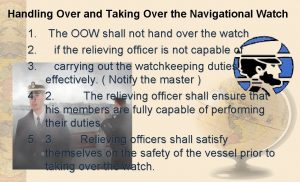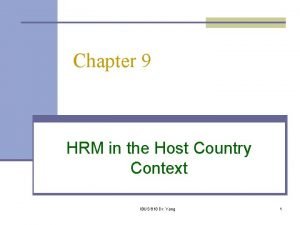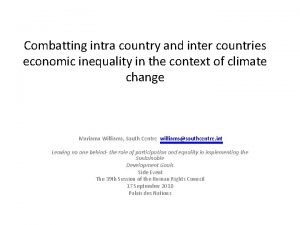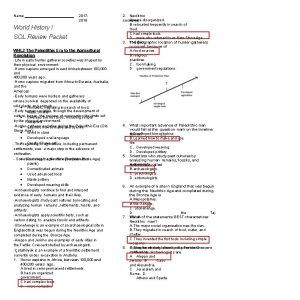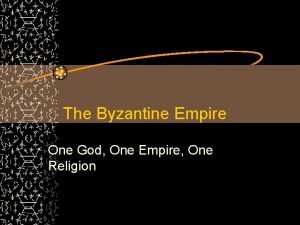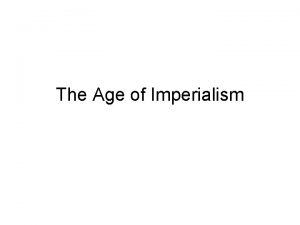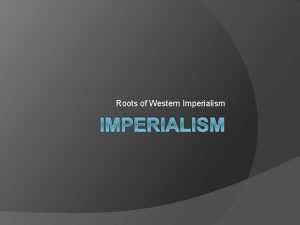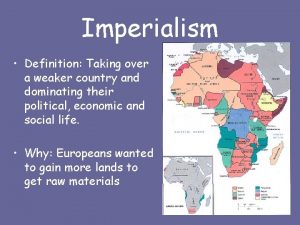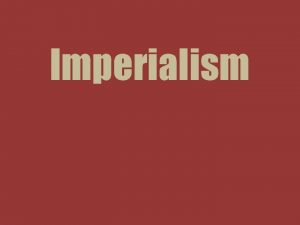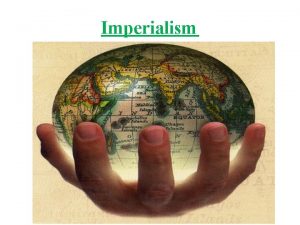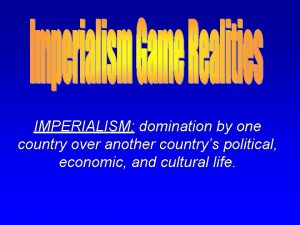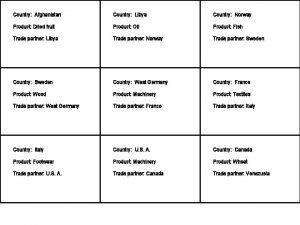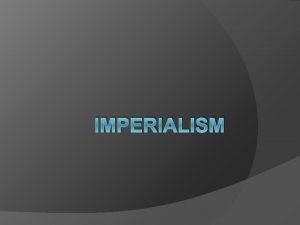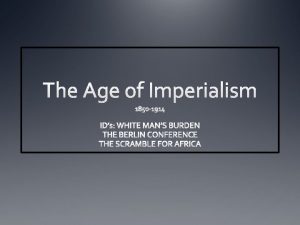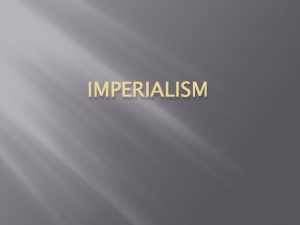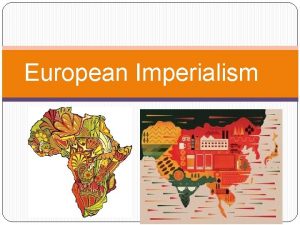Imperialism Review Packet Imperialism One country taking over























- Slides: 23

Imperialism Review Packet

Imperialism �One country taking over other lands politically, economically, and socially �Old Imperialism – 1500 s & 1600 s Americas �New Imperialism – 1700 s & 1800 s Africa/Asia

Causes of Imperialism �Economic: Industrial Revolution had happened, countries needed raw materials and markets Mercantilism: To establish a favorable balance of trade �Nationalism: European countries competing w/ each other for power & prestige �Racism/Social Darwinism: Europeans were ethnocentric, “survival of the fittest”, “White Man’s Burden”

Positive and Negative Effects of Imperialism + and – Effects on Colonizer/Mother Country + and – Effects on the Colony �Countries became � Positive: Modern wealthy and powerful �Spread their culture/influence �Natural resources & markets technology, improved transportation, education, medical care � Created rivalries and war, poverty, hurt culture & pride, cash crops created food shortages, population explosion

Imperialism in Africa �Scramble for Africa – competition among European nations to grab land in Africa �Berlin Conference – meeting of European nations in 1884 to divide up Africa �White Man’s Burden – poem by Rudyard Kipling, racist attitude toward non. Europeans, justification for imperialism �Boers – Dutch farmers in South Africa

Imperialism in Africa �European countries wanted raw materials, markets to sell their finished goods to, and the most land so they could have an advantage over other countries �Social Darwinism – some races were said to be inferior; this legitimized imperialism

Imperialism in Africa �Slavery �Competition = “Scramble for Africa” �Boer War – British fought Dutch whites in South African and won �Rise of Nationalism = pride in one’s nation

Impact of Imperialism in Africa �Ethnic conflict and rivalries/war �Poverty �New technology and infrastructure �Medical care �Education

Imperialism in India - Geography �India is a subcontinent, which means it is part of a continent but is politically or geographically separate. �It is separated from the rest of Asia by the Himalaya Mountains. �The Ganges River is sacred to the Hindu religion. India’s farmers depend on the monsoons, which come each year and are the reversal of wind systems that bring heavy rain. Helps crops grow but can cause flooding!

British Imperialism in India �The British defeated the Mughals in 1757. The Mughal Empire had expanded Muslim control into India. The British East India Company forced Indian rulers to sign treaties granting it greater power than them. It collected taxes, owned land, and controlled trade between India and Britain. India became known as the “jewel in the crown” which showed how valuable India was as a colony to Britain.

British Imperialism in India �East India Co. came under control of British government in 1830 s. Many Indians resented British rule. �British trained soldiers, known as sepoys, rebelled against their British officers for religious issues. �British soldiers put down the Sepoy Rebellion. India became a British possession and ruled for 100 years.

Effects of British Rule in India �Transportation and communication improved �Indian resources went to Britain �Local Indian industries destroyed as British made goods took over �Farms grew cash crops = food shortages �Hospitals, irrigation systems, health care improvements (population increased) �Hurt Indian culture and pride �India unified under one government �Education at British schools �English as a unifying language

Imperialism in SE Asia - Geography �Many countries in SE Asia are either peninsulas or islands. A chain of islands, like Malasia or Indonesia, is called an archipelago. SE Asia is located on the Equator, so it is very hot and humid. �Many countries have a high population density, meaning very crowded. Population continues to grow. �The spreading and exchanging of ideas (cultural diffusion) has been a very important force. Neighboring countries China and Japan have affected SE Asian nations.

Imperialism in SE Asia �Imperialism in SE Asia occurred because Western countries wanted natural resources and markets. These lands were perfect for plantation agriculture. Mother countries and their colonies: United States – Puerto Rico, Guam, Philippines, Hawaii Great Britain – Singapore, Burma, Malaysia Netherlands – Indonesia France – Indochina (Vietnam, Cambodia, Laos)

Imperialism in SE Asia � British used Singapore as a base for trade. The British encouraged Chinese to move to Malaysia, which led to tension. Some improvements: schooling, health, sanitation. � Siam remained independent and modernized. � US also sought colonies in SE Asia. After the Spanish. American war, the US took control of Puerto Rico, Guam, and the Philippines. Hawaii was annexed by the US after Queen Liliuokalani was overthrown.

Imperialism in China – Geography & History �China’s geography is extremely diverse. Early Chinese civilization developed around the Huang He (Yellow) River, which has the nickname China’s Sorrow because of floods. Deserts and mountains naturally isolate it from other areas. China became ethnocentric and called themselves The Middle Kingdom.

Imperialism in China �Other nations want to imperialism China for: silk, tea, porcelain, flat fertile land, large population, and good location for trade. �The Chinese wouldn’t trade with Europe because they felt they were superior (ethnocentrism). �England began Opium Wars. The Treaty of Nanking ended the fighting and said that Britain could trade in most Chinese ports. �Britain didn’t have to obey Chinese law in these ports, which is called extraterritorial rights.

Imperialism in China �Treaty gave Britain control of Hong Kong for 99 years. �Dowager Empress Xigi tried some small reforms but China continued to face problems. �Other foreign countries set up sphere of influence, meaning they controlled trade there. �The US opposed these, and urged an Open Door Policy where all foreign nations would have equal access to Chinese markets. China now dominated by foreign powers.

Rebellions in China �In the Taiping Rebellion, Chinese peasant rebels tried to take control due to the Qing Dynasty’s poor response to the Opium Wars and foreign involvement. It took 14 years for the government to put down this rebellion. China knew it had to modernize. �In the Boxer Rebellion, group of Chinese wanted foreigners out of China organized and attacked. Western powers crushed Boxers.

Japan – Geography & Religion �Japan is an archipelago with 4 main islands. It is small and densely populated. Japan is part of the Ring of Fire. �Very mountainous, many earthquakes. Climate affected by monsoons (like India!) �There are not many natural resources. Japan will imperialize in order to get resources. �Japan used terrace farming to farm in mountains. �Shintoism is the worship of the kami. Very similar to animism.

Feudalism in Japan � Social and political system based on land exchange for loyalty and services (military/farming). Strict class structure like Middle Ages in Europe. � Samurai followed code of bushido. � The Tokugawa Shogunate ruled Japan from 1603 to 1868 and was most successful shogunate.

Rise of Japan �Because of geography and ethnocentrism, Japan did not want to trade or be involved with other nations. This is called being isolated. �US President Fillmore sent Commodore Matthew Perry to Japan to open diplomatic relations (gunboat diplomacy). �The 2 countries signed the Treaty of Kanagawa and Japan began trading with the US.

Rise of Japan �Tokugawa Shogun eventually overthrown. In 1868 the Emperor was restored to the throne. He decided Japan needed to adopt western ways. This is known as the Meiji Restoration. �This is a time of great change for Japan. Eventually became a modern, industrialized nation and began a policy of imperialism. �Japan won the Russo-Japanese War, shocking the world. �In 1910. Japan annexed Korea and ruled the people there very harshly.
 Explain how to handing over and taking over the watch
Explain how to handing over and taking over the watch Africa 1890
Africa 1890 Old vs new imperialism
Old vs new imperialism Packet over sdh
Packet over sdh Host country and home country
Host country and home country Intra country vs inter country
Intra country vs inter country Review packet section 1 factoring
Review packet section 1 factoring Spanish 1 review packet answer key
Spanish 1 review packet answer key World history ii sol review packet
World history ii sol review packet Algebra
Algebra Chemistry sol review packet
Chemistry sol review packet Geometry sol review packet
Geometry sol review packet World history semester 2 final review packet
World history semester 2 final review packet Spanish 2 review packet
Spanish 2 review packet Biology keystone review packet answer key
Biology keystone review packet answer key Algebra 2 semester 2 final exam
Algebra 2 semester 2 final exam Biology keystone review packet answer key
Biology keystone review packet answer key Biology keystone review packet
Biology keystone review packet Living environment review packet
Living environment review packet Dna review packet
Dna review packet Anna neary
Anna neary Systematic review in history taking
Systematic review in history taking One god one empire one religion
One god one empire one religion One one one little dog run
One one one little dog run
